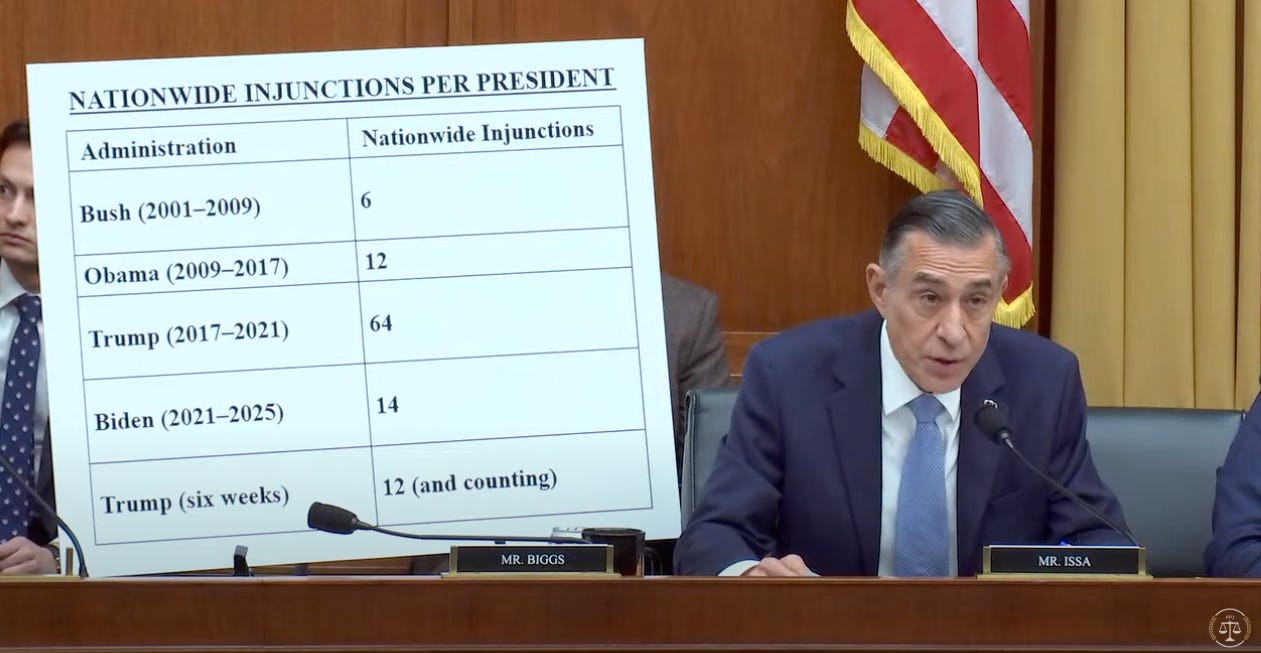Congress Set to Combat Courts as Battle Between the Branches Explodes Over Trump-Thwarting Universal Injunctions
A transcendent war has broken out as the Supreme Court lets individual district court judges micromanage a president.

Injunction Dysfunction or Tyrant Disruption? Trump-Era Judicial Paralysis Explained
Can a single judge unilaterally thwart the president of the United States?
That’s the contentious question the Trump administration asked the Supreme Court to resolve last week in response to court orders blocking its effort to curtail birthright citizenship, and after a slew of decrees requiring the president do everything from halting major actions on DEI and domestic spending to disbursing billions in foreign aid.
At issue is a legal remedy, universal injunctions, that allows any of the nearly 700 federal judges to prevent the president from enforcing policies not only against those bringing a case but anyone, everywhere. Universal injunctions were rare until the first Trump administration, when their usage exploded as Democrats and progressives turned to the courts to block many of his policies.
In the early days of Donald Trump’s second administration, courts have issued such injunctions at a historic pace and with growing potency, notably over the weekend with a suspension in deportations of Venezuelan gang members without a hearing. During the month of February alone, district court judges, most nominated by Democrats, ordered 15 such injunctions – more than Joe Biden faced during his first three years as president. Courts from Washington, D.C., to Washington State have issued injunctions in “epidemic proportions,” now not only governing “the whole nation” but “the whole world,” the administration says.
The injunctions come in response to the 100-plus lawsuits that, critics argue, blue states, progressive nonprofits, and ex-government officials have deliberately brought before sympathetic judges – a tactic known as “forum shopping” or “judge shopping” that both parties have employed.
Democrats and progressive legal scholars argue these injunctions are a necessary brake because Trump is creating what they call a constitutional crisis by pushing the bounds of his office. “Thankfully,” Senate Judiciary Committee Ranking Democrat Dick Durbin has said, “the judiciary is performing its duty to check the executive.”
The universal injunctions ordered so far have not only hamstrung the president but raised myriad legal and practical questions, some of which the administration raised in its applications to stay the birthright citizenship injunctions filed last week. These include whether a court’s authority is limited to ruling on cases and controversies concerning the parties before it; if it’s reasonable for the federal government to have to “run the table over months of litigation in multiple courts of appeals to have any chance of implementing” its policies; and to what extent the Supreme Court wishes to see conflicting circuit court opinions as to universal injunctions’ legitimacy persist.
So far, the nation’s highest court has been unwilling to resolve these questions, despite past pleadings from Justices Clarence Thomas and Neil Gorsuch and the Biden administration. The Supremes’ reticence was brought into stark relief earlier this month when a 5-4 majority issued a one-page opinion involving a D.C. district court’s universal injunction halting the Trump administration’s “pause” on foreign assistance. The ruling neither grappled with the merits of the case nor the ability of the trial judge, Amir Ali, to, in critics’ eyes, micromanage a president.
In a blistering, seven-page-plus dissent, Justice Samuel Alito wrote that he was “stunned” that the court’s majority had asserted that "a single district court judge" has “the unchecked power to compel the Government of the United States to pay out (and probably lose forever) 2 billion taxpayer dollars.”
The court's reluctance to weigh in as such cases have worked their way through the lowers courts has left all three branches of government in limbo, and increasingly at each other's throats. As the Trump administration accused “liberal district court judges” of “abusing their power” to unilaterally block the president’s basic executive authority, frustrated congressional Republicans are moving to pass legislation to curtail universal injunctions while making it harder to “judge shop.” Some are even pursuing the more extreme measure of impeaching judges perceived to have overstepped their authorities – recently drawing the ire of at least two federal circuit court judges.
The dueling clashes between Democrats and a president they see as overreaching in pursuit of his agenda, and Republicans and a judiciary they see as overreaching while the Supreme Court sits idly by, come months after Chief Justice John Roberts issued a report hailing judicial independence and fretting over purported threats to it.'
Read my full report on this constitutional confrontation of critical significance at RealClearInvestigations.


